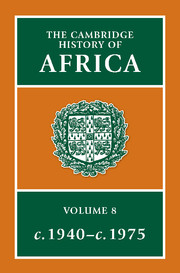Book contents
- Frontmatter
- Introduction
- 1 The Second World War: prelude to decolonisation in Africa
- 2 Decolonisation and the problems of independence
- 3 Pan-Africanism Since 1940
- 4 Social and cultural change
- 5 The economic evolution of developing Africa
- 6 Southern Africa
- 7 English-speaking West Africa
- 8 East and Central Africa
- 9 The Horn of Africa
- 10 Egypt, Libya and the Sudan
- 11 The Maghrib
- 12 French-speaking tropical Africa
- 13 Madagascar
- 14 Zaire, Rwanda and Burundi
- 15 Portuguese-speaking Africa
- Bibliographical essays
- Bibliography
- Index
- References
Introduction
Published online by Cambridge University Press: 28 March 2008
- Frontmatter
- Introduction
- 1 The Second World War: prelude to decolonisation in Africa
- 2 Decolonisation and the problems of independence
- 3 Pan-Africanism Since 1940
- 4 Social and cultural change
- 5 The economic evolution of developing Africa
- 6 Southern Africa
- 7 English-speaking West Africa
- 8 East and Central Africa
- 9 The Horn of Africa
- 10 Egypt, Libya and the Sudan
- 11 The Maghrib
- 12 French-speaking tropical Africa
- 13 Madagascar
- 14 Zaire, Rwanda and Burundi
- 15 Portuguese-speaking Africa
- Bibliographical essays
- Bibliography
- Index
- References
Summary
Whether the Second World War marked a decisive stage in the colonial history of Africa, unleashing forces that, with hindsight, we can see made political decolonisation by even the most reluctant of European powers inevitable, or whether it merely hastened a process that was already, if not very obviously, under way, will long remain a matter for debate. There is much to be said for both views. What is clear is that nearly all writers on the colonial period of Africa's past accept, or at least pay lip service to, the view that for whatever reason the Second World War represented a watershed in the history of the continent. Yet curiously few of them give its course or impact detailed attention. It is as though it were an interval between the two acts of a play in which the audience is asked to accept that there has been a passage of time but is given only the barest outline of what has happened meanwhile.
There are many serious studies of, on the one hand, the years 1919–1939 – the period of classic colonial rule- and, on the other, the years immediately following the war – the period of ‘decolonisation’ or ‘the transfer of power’. Few historians have interested themselves in both periods, and the latter period has mostly been left to the attention of political scientists. Conversely, few political scientists have paid much attention to the years before 1945. The Second World War seems to represent a boundary between what is regarded as the proper territory of the historian and what is the province of the political scientist or journalist.
- Type
- Chapter
- Information
- The Cambridge History of Africa , pp. 1 - 7Publisher: Cambridge University PressPrint publication year: 1984



